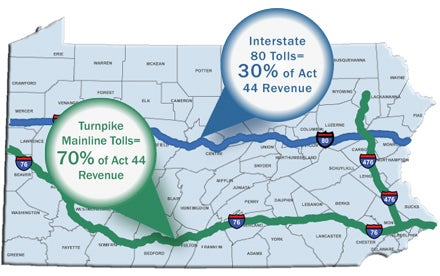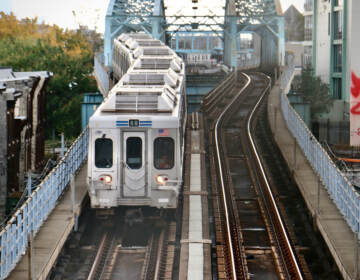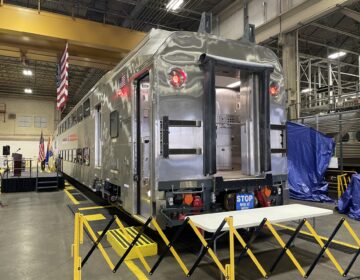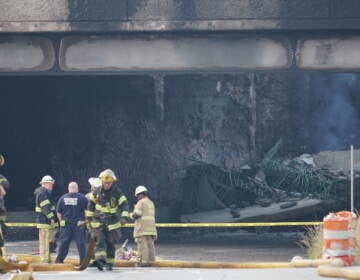Northeast rail corridor gets $745M for upgrades
Reading this on a train during your morning commute? Then we’ve got some good news:
The federal Department of Transportation is putting $745 million toward rail projects that will allow trains to travel up to 160 mph in some sections of the Northeast Corridor and construction that will allow Amtrak trains to avoid a congested rail junction in part of New York City.
Transportation Secretary Ray LaHood announced the funding yesterday.
About $450 million will be used to upgrade electrical systems and tracks between Trenton, N.J., and New York. The upgrade means Acela Express trains will be able to achieve a top speed of 160 mph between Trenton and New Brunswick, N.J. The current top speed is 135 mph.
About $295 million will be used to construct an overpass at the Harold Interlocking rail junction in Queens. It’ll separate Amtrak from Long Island Rail Road and Metro-North commuter trains, easing congestion.
WHYY is your source for fact-based, in-depth journalism and information. As a nonprofit organization, we rely on financial support from readers like you. Please give today.
Funding key issue at transportation hearing

June 4, 2010
By Anthony Campisi
For PlanPhilly
The Pennsylvania House Transportation Committee took its push for more infrastructure funding on the road, holding the fourth of seven planned hearings throughout the state at St. Joseph’s University Friday.
But a change in venue didn’t provide an easy way out for lawmakers — they’ll be forced to raise taxes or fees to plug the hole left by the state’s failed efforts to toll Interstate 80.
Though the committee heard from a wide range of speakers representing the city and suburban counties, transit operators, the Pennsylvania Department of Transportation and business groups, no one stepped forward with a painless solution.
And lawmakers, for their part, seemed to be searching for the political cover they’d need to raise taxes in an election year.
They appeared to get some when Timmy Nelson of the Pennsylvania Motor Truck Association, the state’s trucking industry trade group, said his group supported an increase in the gas tax in exchange for well-maintained roads and bridges.
(The Delaware Valley Regional Planning Commission estimates that a gas tax increase of 7 or 8 cents a gallon would fill the funding hole in Act 44.)
But Democratic committee chairman Joseph Markosek, of Allegheny County, and Luzerne Democrat Mike Carroll repeatedly pushed local stakeholders to pressure local lawmakers for support and to convince townships to pass resolutions in favor of higher taxes and fees.
Carroll also appeared to take a swipe at Senate Majority Leader Dominic Pileggi by asking SEPTA general manager Joe Casey why a high-ranking legislator from SEPTA’s service area was questioning the seriousness of the region’s infrastructure needs.
He told Casey and others they needed to better “educate” skeptics.
Democratic Rep. Kathy Manderino echoed Carroll, saying that SEPTA and other stakeholders need to “make that money stuff very real” by showing the impact of not funding mass transit, highways and bridges.
Manderino appeared to be the most pessimistic of her colleagues on the chances of passing a legislative fix this year. The Democrat criticized the state Senate for not holding similar hearings and said that “we are doing our citizens … a great disservice” in failing to act.
“We are not going to have a vote this year” until residents and interest groups are motivated and take “drastic measures,” she said.
Manderino reserved her own drastic solution for PennDOT’s Southeastern Pennsylvania chief. She wants PennDOT to close bridges needing deferred maintenance. She argued this would both prevent anyone from being killed by a bridge collapse and serve to illustrate to taxpayers where their dollars are going.
When not griping about the political problems confronting them, the lawmakers seemed to hone in on ways of giving regions more tools for raising local money to maintain local infrastructure.
Rina Cutler, Philadelphia’s deputy mayor for transportation and utilities, asked the lawmakers to pass legislation allowing local jurisdictions to enact local taxes to pay for road and transit projects.
She and others also asked the Legislature for power to enter into public-private partnerships — so-called “P3s” — to help fund infrastructure improvements.
Committee members honed in on the potential P3s have in reducing the state’s share of capital and maintenance costs related to infrastructure.
At the same time, it’s clear that P3s — in which private developers pay for the right to toll a road and pick up its maintenance costs — won’t totally solve the problem and come with political challenges of their own.
State Rep. Michael Sturla, policy chairman for the Democratic caucus, said that tolls set too high would spark a backlash.
He supports an effort to change PennDOT funding formulas so that more heavily traveled roads get more subsidies than they currently do.
Sturla wasn’t the only person who wants to change existing funding formulas — Alex Doty of the Bicycle Coalition of Greater Philadelphia pushed for more state funding for pedestrians and bicyclists in his testimony.
While none of the testimony provided lawmakers with a magic bullet, Markosek and Rep. Richard Geist, the top Republican on the committee, both said a funding fix was possible.
Markosek said the committee’s bipartisan efforts might allow lawmakers to make the “big, heavy lift” of passing new taxes in an election year.
For his part, Geist is pushing an ambitious agenda — he wants to pass a package of bills that will reform transportation funding “in one fell swoop.”
Previous coverage: http://planphilly.com/stakeholders-tough-fight-infrastructure-funding
Contact the reporter at campisi.anthony@gmail.com
WHYY is your source for fact-based, in-depth journalism and information. As a nonprofit organization, we rely on financial support from readers like you. Please give today.





